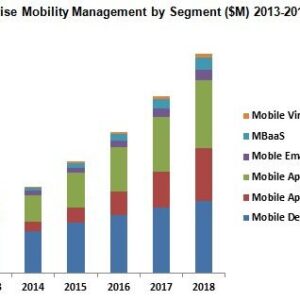Software is becoming an increasingly important part of telecommunication networks and deployments as both wired and wireless carriers look to add functionality to operations while increasing simplicity and reducing costs. RCR Wireless News is keeping an eye on recent developments through its weekly “Software” wrap up.
–Software is set to impact the hardware world of backhaul services, as a new report from Infonetics Resrarch found mobile operators are looking towards software-defined networking and network function virtualization to “provide greater backhaul flexibility and cost savings.”
The survey of 25 telecom operators across Asia, Latin America, North America, Europe, the Middle East and Africa, found 29% of respondents are deploying or plan to deploy SDN into their backhaul network “at some point.” A majority (63%) said they are evaluating the prospects, though have not yet set a timetable.
–A new report from 451 Research forecasts the enterprise mobility management market will grow from $3.8 billion in revenues this year to $9.6 billion in 2018. The firm defines the EMM space “as a set of tools that include mobile device management, mobile application management, mobile email container applications, mobile application platforms, mobile back-end as a service and mobile virtualization, can be used solo, in parallel or in a tiered fashion across a mobile environment.”
“EMM is moving from tools that control mobility, to instrumental elements that enable productivity for a growing number of mobile-enabled employees,” said Chris Hazelton, research director for 451 Research’s Enterprise Mobility channel, in a statement. “Mobile apps in the enterprise are growing in importance and are the key to driving business transformation, and EMM will play a key role in putting these apps in the hands of users. As companies move from a reactive to a mobile-first strategy, EMM technologies will be the foundation for any deployment.”
–Enterprise cloud computing provider Salesforce.com threw its hat into the analytics market, launching its Wave analytics cloud platform. The company claims the offering allows customers to gain greater insights into data sources on their networks.
Mobility was noted as a central point of the offering, with the Wave user interface optimized to allow application developers to take advantage of mobile platforms that allow customers to access insight from smartphones and tablets. The platform’s mobile application will initially be available for Apple’s iOS-powered devices, with further support “forthcoming.”
The platform is set to be commercially available in English on Oct. 20, with additional language support set for a later rollout. The basic license runs $125 per user and includes the ability to view, discover, personalize and share data insights and dashboards. For $250 per user, Salesforce adds the ability to create, deploy and manage data sets, data connections and user access.
Analysts noted the move was a long-time coming, with the offering a good match for its current offerings.
“Salesforce.com has long needed to provide its users with an analytics platform to provide information at their fingertips across different devices,” explained Sheryl Kingstone, director at 451 Research. “It’s been an extremely big gap in its product suite, forcing existing customers to choose other products – now competitors – such as Tableau, Qlik and Microsoft. Over the past few years, Salesforce has been building a solution that focuses on the big data revolution and that taps into its platform as a key differentiator. … The solution is a perfect value proposition for customers looking to tap into user experience data tied to transactional data for fresh insights beyond traditional reports. However, some businesses that have already invested in Tableau may not switch to Salesforce.com’s analytics service.”
–Broadsoft announced that BT will tap into Broadsoft’s BroadCloud managed services platform for BT Cloud Voice, which is a cloud-based IP voice and unified communications service targeting enterprise customers.
The hosted, cloud-based service is designed to support high-definition voice, conferencing, smart call handling, instant messaging, presence, cloud call recording, customer retention management integration and Web collaboration.
Broadsoft earlier this year signed a deal with Sprint to use its BroadWorks platform to support enhanced voice-over-IP services.
–Cellwize reported that its centralized self organizing network solution Elastic-SON has been commercially deployed by Telefónica UK in a move to “enhance mobile network performance and quality of service for U.K. subscribers.”
Cellwize noted that Telefónica UK was the first in the Telefónica Group to deploy its product, as well as the first in the U.K. to deploy a SON solution servicing 2G, 3G and LTE technologies.
Telefónica UK, which operates in the U.K. under the O2 brand, currently shares many of its network assets with rival Vodafone UK. That deal stems from an agreement in 2012, when they announced plans to cooperate on “basic” network infrastructure that will see them share assets across 18,500 cell sites. Cellwize explained that the arrangement further tested its SON platform as it needed to work across different technologies using equipment from multiple suppliers. The company added that its platform has already been implemented by operators using equipment from Ericsson, Nokia Networks and Huawei.
Make sure to check out the latest in telecom-related software news at RCR Wireless News’ dedicated software page. Also, if you have telecom software news to share, please send it along to: dmeyer@rcrwireless.com.
Bored? Why not follow me on Twitter?
Photo copyright: wmitrmatr / 123RF Stock Photo



